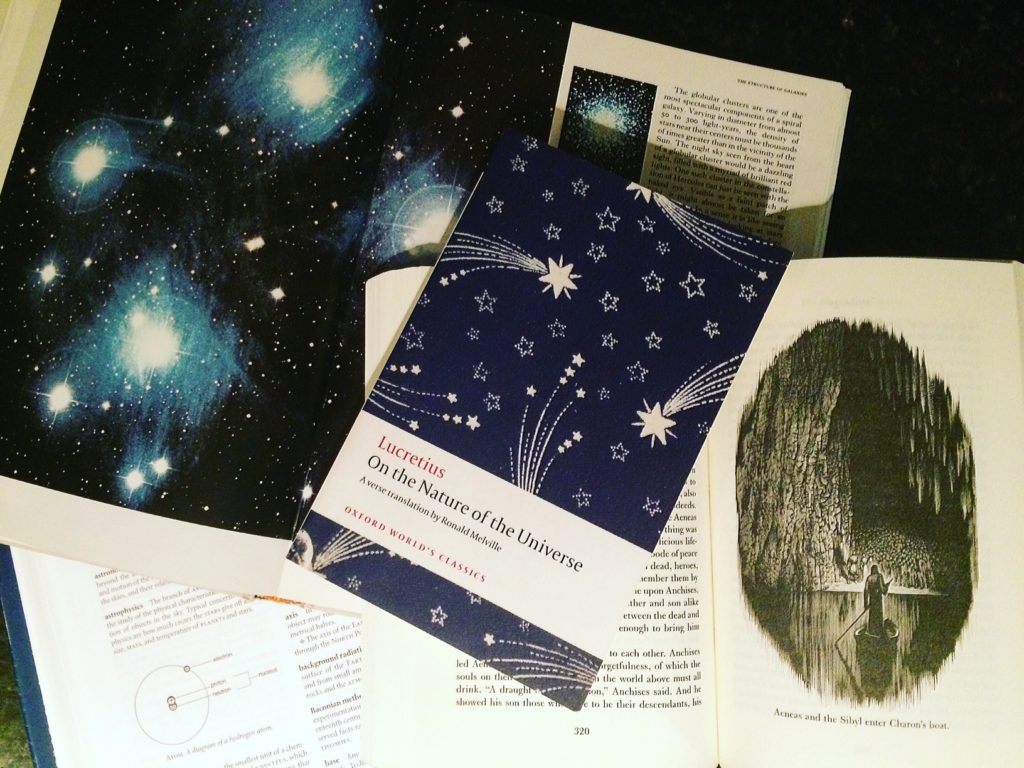
De Rerum Natura is book #34 from The Literary Project.
De Rerum Natura–or On the Nature of the Universe–is a didactic poem that is, as a whole, “a philosophical meditation on human happiness.” It explores the world from an epistemological perspective—possibly the earliest form of scientific inquiry that attempts to divorce itself from religious or other metaphysical beliefs. The work is “an exposition of Epicureanism” and, as such, offers Epicureanism as a solution to misery and suffering. In short:
- everything in existence is made up of “atoms and void and nothing else,”
- the universe is ruled by the laws of physics, not intelligent design nor divine intervention, and
- there is no afterlife because there’s no such thing as ethereal objects (see point 1).
This belief that the world is purely physical means that they believed the gods existed, but as physical beings in some faraway place who did not interact or care about humans in any way. It also led them to believe that the soul is a physical element within the body, no different than one’s nose or arm. The former belief meant there was nothing to fear from the gods. The latter meant that there was nothing to fear from death. One died and simply ceased to exist—suffering through life because of a fear of the possibility of going to Hell, because of a fear of punishment doled out to one’s (nonexistent) “soul” by the (never present) gods, was pointless. Hence, the Lucretian line, “Death is nothing to us”:
“…death nothing is to us, nothing
That matters at all, since mind we know is mortal…
…
…when the end shall come, when the close bonds
Of body and spirit that hold us here shall part
And we shall be no more, nothing can harm us
Or make us feel, since nothing of us remains…”
(Book 3, 830-831 & 838-842)
“…we may be certain that in death
There is nothing to fear, that he who does not exist
Cannot feel pain, that it makes no difference
Whether or not a man has been born before,
When death the immortal has taken his mortal life.”
(Book 3, 866-869)
Lucretius also saw that this fundamental fear of death prevented people from living their lives now. Rather than being gratified and fulfilled, people squandered their time on Earth complaining about their old age and impending death. They allowed death to take them away from living before Death ever actually came:
“Consider now an old man who complains
Excessively about his death to come.
Nature would justly cry out louder still
And say in bitter words, ‘Away, you rogue,
With all these tears and stop this snivelling.
All life’s rewards you have reaped and now you’re withered,
But since you always want what you have not got
And never are content with that you have,
Your life has been unfulfilled, ungratifying,
And death stands by you unexpectedly
Before the feast is finished and you are full.”
(Book 3, 952-960)
We would do well to cultivate gratitude and an appreciation for what we have in the here and now. If only people would realize that life today in the here and now is all that exists, perhaps they would live their life in peace rather than in fear and self-torture:
“But in this life there is fear of punishment
For evil deeds, fear no less terrible
Than the deeds themselves,…
…
The guilty conscience filled with wild foreboding
Applies the goad and scorches itself with whips,
…
And fears that after death there’s worse to come.
So fools make for themselves a Hell on earth.”
(Book 3, 1014-1023)
“…Fools make for themselves a Hell on earth.” It’s amazing, what people do to themselves, both 2,500 years ago and today. But if we accept the truth of impermanence, if we stop resisting death, then perhaps we will discover peace and happiness in life while we do exist in the world.
Lucretius’s poem is, ultimately, a beautiful, metaphysical meditation on mortality; it helps us accept the inevitability of death, while lighting the way to fulfillment within our lives.
